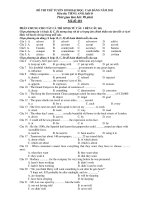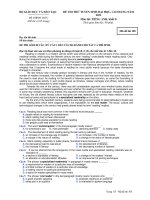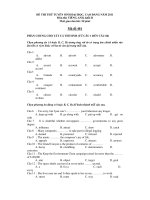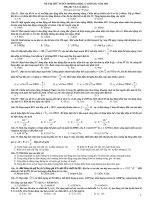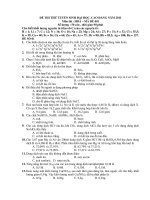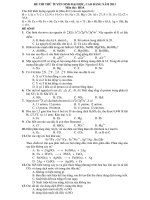ĐỀ THI THỬ TUYỂN SINH ĐẠI HỌC, CAO ĐẲNG NĂM 2011 Môn thi: Tiếng Anh, Khối D - Mã đề thi 123 docx
Bạn đang xem bản rút gọn của tài liệu. Xem và tải ngay bản đầy đủ của tài liệu tại đây (156.99 KB, 7 trang )
Đề 002 Trang 1
BỘ GIÁO DỤC VÀ ĐÀO TẠO ĐỀ THI THỬ TUYỂN SINH ĐẠI HỌC, CAO ĐẲNG NĂM 2011
(Đề thi gồm 05 trang) Môn thi: Tiếng Anh, Khối D
Thời gian làm bài: 90 phút
Họ, tên thí sinh: ………………………………………………
Số báo danh: ………………………………………………….
(Đề thi gồm từ câu 1 đến câu 80 dành cho tất cả các thí sinh)
Mark the letter A, B, C or D on your answer sheet to indicate the word whose underlined part is
pronounced differently from that of the rest in each of the following questions.
Question 1: A. myth B. breath C. tooth D. with
Question 2: A. plantonits B. magazines C. telephones D. vegetables
Question 3: A. packed B. punched C. pleased D. finished
Question 4: A. accompany B. accident C. occur D. occasionally
Question 5: A. month B. boss C. shop D. got
Mark the letter A, B, C or D on your answer sheet to indicate the word that differs from the rest in the
position of the main stress in each of the following questions
Question 6: A.invite B. between C. improve D. forward
Question 7: A.dangerous B.parachute C. popular D. magazine
Question 8: A.sincerely B. completely C. faithfully D. extremely
Question 9: A. difficulty B. individual C. population D. unemployment
Question 10: A. essential B. salary C. industry D. interview
Read the following passage and mark the letter A, B, C or D on your answer sheet to indicate the
correct answer to each of the quetions from 11 to 15.
Over the past 600 years, English has grown from a language of few speakers to become the
dominant language of international communication. English as we know it today emerged around 1350,
after having incorporated many elements of French that were introduced following the Norman invasion
of 1066. Until the 1600s, English was, for the most part, spoken only in England and had not extended
even as far as two centuries, English began to spread around the globe as a result of exploration, trade
(including slave trade), colonization, and missionary work. Thus, small enclaves of English speakers
became established and grew in various parts of the world. As these communities proliferated, English
gradually became the primary language of international business, banking and diplomacy.
Currently, about 80 percent of the information stored on computer systems worldwide is English.
Two - thirds of the world’s science writing is in English, and English is the main language of
technology, advertising, media, international airports, and air traffic controllers - Today there are more
than 700 million English users in the world, and over half of these are nonnative speakers, constituting
the largest number of nonnative users than any other language in the world.
Question 11: What is the main topic of this passage?
A. The French influence on the English Language.
B. The English history.
C. The expansion of English as an international language.
D. The use of English for science and Technology.
Question 12: Approximately when did English begin to be used beyond England?
A. in 1066 B. around 1350 C. before 1600 D. after 1600
Question 13: According to the passage, all of the following contributed to the spread of English around
the world except.
A. the slave trade B. the Norman invasion
C. missionaries D. colonization
Question 14: The word “enclaves” in line 6 could be best replaced by which of the following.
A. communities B. organizations C. regions D. countries
Question 15: The word “proliferated” in line 7 is closest in meaning to which of the following
A. prospered B. organized C. disbanded D. expanded
Mã đề thi 123
Đề 002 Trang 2
Read the passage and choose one word or phrase marked A, B, C or D that best fits each of the gaps:
THE FIRST WOMAN SCIENTIST
Hypatia was born in Alexandria, in Egypt, in 370 A. D. For many centuries she was…. (16) only
woman scientist to have a place in the history books.
Hypatia’s father was a director of Alexandria University, and he (17) sure his daughter had the
best education available. This was unusual, as most women then had few….(18) to study.
After studying in Athens and Rome, Hypatia returned to Alexandria…(19) she began teaching
mathematics. She soon became famous…(20)her knowledge of new ideas.
We have no copies of her books,…(21) we know that she wrote several important mathematical
works. Hypatia was also interested in technology and….(22)several scientific tools to help with her
work. At that …(23)many rulers were afraid of science, and…(24)connected with it was in danger. One
day in March, 415,, Hypatia…(25) attacked in the street and killed
Question 16: a. one b. the c. a d. an
Question 17:. a. could b. made c. said d. put
Question 18: a. classes b. customs c. opportunities d. teachers
Question 19:. a. where b. how c. there d. which
Question 20:. a. from b. by c. for d. in
Question 21:. a. because b. but c. or d. as
Question 22:. a. did b. experimented c. invented d. learnt
Question 23:. a. day b. period c. year d. time
Question 24:. a. anyone b. nobody c. all d. something
Question 25:. a. was b. had c. has d. is
Identify one underlined part that is incorrect in each of the following sentences by marking the letter
A, B, C or D on your answer sheet
Question 26: Mrs Stevens, along with her cousins from New Mexico, are planning
A B C
to attend the festivities.
D
Question 27:The company has so little money that it can’t hardly operate anymore.
A B C D
Question 28: Hung Yen has long been well - known for it’s excellent longan fruits
A B C D
Question 29:Please let me know whether you still want to go or that you have changed your plans.
A B C D
Question 30: : The 6 - year - old boy resembles to his mother some what more than does his
A B C D
older brother .
Mark one option A, B, C, or D that best rewrites each of the following sentences:
Question 31: If only I had not seen her.
A. I wish I had seen her B. I wish I had not seen her
C. I have not seen her for ages D. She wishes she had come to see me
Question 32: I’m sorry that he won’t accept the job he’s been offered.
A. I wish he would accept the job he’s been offered
B. I wish he had accept the job he’s been offered
C. I wish he would have accepted the job he’s been offered
D. I wish he will accept the job he’s been offered
Question 33: “John shouldn’t have behaved so badly,” said Janet.
A. Janet doesn’t like John’s behaviour. B. Janet dislikes John.
C. Janet objected to John’s bad behaviour. D. Janet was angry with John
Question 34: I was astonished that she didn’t pass her exam.
A. That she failed in her exam astonished me. B. I was astonished that her exam is not over.
Đề 002 Trang 3
C. I was astonished that she did pass her exam.D. She didn’t pass her exam, which astonished her.
Question 35: No sooner had they found her number than they called her.
A. They called her as soon as they found her number.
B. They found her number sooner or later.
C. They called her number sooner or later.
D. They found her number as soon as they called her.
Choose the best option A, B, C, or D to complete the following sentences:
Question36 : ______ of his childhood home in Hannibal, Missouri, provided Mark Twain with the
inspiration for two of his most popular novels.
A. Remembering B. He remembered
C. Memories D. It was the memories
Question 37: : She is not a teenager any more. She looks quite ______ now.
A. grown-up B. grown through C. overgrown D. outgrown
Question 38: The change in timetable will ______ many students having to catch an earlier bus
A. cause B. result C. lead D. mean
Question 39: The girls and flowers ___________ he painted were vivid.
A. Who B. Which C. Whose D. That
Question 40: All night long people dance and sing. They do it ___________
A. during the whole night B. in all the night
C. the night long D. in the night
Question 41: After he ___________ work, he went straight home
A. had finished B. had been finishing
C. has finished D. would finish
Question 42: What did you think of the book ?
___________ the books I’ve read. It was the most interesting
A. From all B. All C. All of D. Of all
Question 43: I can’t see the stage very well from here. “___________”
A. Neither can’t I B. Neither I can
C. I can’t neither D. Neither can I
Question 44: I applied for the job that I saw ___________ in the paper.
A. advertising B. advertised C. be advertised D. being advertising
Question 45: He’d prefer ___________ chicken soup rather than ___________ milk
A. having / having B. to have / drink
C. have / drink D. had / drank
Question 46: Man’s use of colours ______ back to the time when men first used red and yellow clays to
paint their bodies.
A. dating B. dates C. dated D. had dated
Question 47: She wants to go shopping, but she has hardly ______.
A. no money B. any money C. little money D. some money
Question 48: Jenifer is ______ in asking for bigger salary. She has worked really hard.
A. reason B. reasonable C. reasonably D. unreasonable
Question 49: General ______, learning a foreign language is interesting, but not easy.
A. spoken B. speaks C. speak D. speaking
Question 50: ______ having a well-paid job, she never has any money.
A. Let alone B. Even though C. Despite D. For
Question 51: Let’s begin our discussion now, ______?
A. won’t we B. will we C. shall we D. don’t we
Question 52: ______ had the curtain been raised than the light went out.
A. Hardly B. No sooner C. Scarcely D. Only when
Question 53: Jim ______ care of himself. He left home when he was 16 and has been on his own since
then.
A. used to take B. is used to take
Đề 002 Trang 4
C. is used to taking D. used to be taken
Question 54: Staying in a hotel costs ______ renting a room in a dormitory for a week.
A. twice more than B. twice as much as
C. as much as twice D. as much twice as
Question 55: There has been a sharp _____ in the number of burglaries in this area recently.
A. increase B. advance C. result D. surge
Question 56: A: “When is Mr. Fields planning to retire?”
B: “Soon, I think. He ______ here for a long time. He will probably retire either next year or the
year after that.”
A. is working B. has been working
C. worked D. had been working
Question 57: Peter: “Do you think it will rain?’
Mary: “Oh! ______.”
A. It’s hopeless B. I don’t hope so C. I don’t hope D. I hope not
Question 58: They were fortune ______ from the fire before the building collapsed.
A. rescuing B. to rescue C. to have rescued D. to have been rescued
Question 59: Don’t try too hard. Don’t ______ off more than you can ______
A. eat - chew B. bite - chew C. eat - swallow D. bite - swallow
Question 60: Jone: “I enjoy listening to pop music.”
Maria: “______.”
A. So am I B. I don’t C. I’m, too D. Neither do I
Question 61: ______ you read the instructions carefully, you will understand what to do.
A. As well as B. Provided C. As far as D. As much as
Question 62: The twins look so much alike that almost no one can ______ them ______.
A. take – on B. tell – away C. take – apart D. tell – apart
Question 63: She’d rather watch television, ______?
A. hadn’t she B. doesn’t she C. didn’t she D. wouldn’t she
Question 64: ______ in astronomy, the discovery of Uranus was by accident.
A. It was like many finds B. Like many finds
C. Alike many finds D. Many alike finds
Question 65: We would contact your nearest relative ______ any accident occurring.
A. in place of B. in spite of
C. on account of D. in the event of
Choose from the four options given (marked A, B, C, or D) one best answer to complete each of the
following sentences:
Question 66: ______ did Arthur realize that there was danger.
A. After he had entered the store B. Only after entering the store
C. On entering the store D. When he entered the store
Question 67: After seeing the movie Centennial, ______.
A. the book was read by many people
B. many people wanted to read the book
C. the book made many people want to read it
D. the reading of the book interested many people
Question 68: Many of the current international problems that we are now facing ______.
A. lacks of the intelligent capabilities of understanding each other
B. linguistic incompetences
C. are because of not understanding themselves
D. are the results of misunderstandings.
Question 69: Mai: “I can’t understand how you missed the exit.”
Hoa: “Well, it was so dark that ______.”
A. we could see the road signs hardly
B. hardly could we see the road signs
Đề 002 Trang 5
C. we could hardly see the road signs
D. we could see hardly the road signs
Question 70: George didn’t do well in the class because ______.
A. he studied bad B. he failed to study properly
C. he was a badly student D. he was not good studywise
Read the following passage and mark the letter A, B, C or D on your answer sheet to indicate the
correct answer to each of the quetions from 71 to 80.
Alfred Bernhard Nobel, a Swedish inventor and philanthropist, bequeathed most of his vast fortune
in trust as a fund from which annual prizes could be awarded to individuals and organizations who had
achieved the greatest benefit to humanity in a particular year. Originally, there were six classifications
for outstanding contributions designated in Nobel’s will, including chemistry, physics, physiology or
medicine, literature and international peace.
The prizes are administered by the Nobel Foundation in Stockholm. In 1969, a prize for economics
endowed by the Central Bank of Sweden was added. Candidates for the prizes must be nominated in
writing a qualified authority in the filed of competition. Recipients in physics, chemistry, and economics
are selected by the Royal Swedish Academy of Sciences; and physiology or medicine by the Caroline
Institute; in literature by the Swedish Academy; and in peace by the Norwegian Nobel Committee
appointed by Norway’s parliament. The prizes are usually in Stockholm on December 10, with the King
of Sweden officiating, an appropriate tribute Alfred Nobel on the anniversary of his death. Each one
includes a gold medal, a diploma, and a cash award of about one million dollars.
Question 71:: What does this passage mainly discuss?
A. The Nobel prizes B. Alfred Bernhard Nobel
C. Swedish philanthropy D. Great contributions to mankind
Question 72: Why were the prizes named for Alfred Bernhard Nobel?
A. He won the first Nobel prize for his work in philanthropy
B. He is now living in Sweden
C. He left money in his will to establish a fund for the prizes
D. He serves as chairman of the committee to choose the recipients
Question 73: How often are the Nobel prizes awarded?
A. Five times a year B. Once every two years C. Once a year
D. Twice a year
Question 74: The word “outstanding” in line 3 most closely means _______.
A. recent B. exceptional C. unusual D. established
Question 75: The word “will” in line 4 could best be replaced by _____.
A. Nobel’s wishes B. a legal document C. a future intention D. a free
choice
Question 76: A Nobel prize would NOT be given to _______.
A. an author who wrote a novel B. a doctor who discovered a vaccine
C. a diplomat who negotiated a peace D. a composer who wrote a symphony
Question 77: The word “one” in paragraph 2 refers to _____.
A. tribute B. anniversary C. candidate D. prize
Question 78: The word “appropriate” in the passage most closely means _______.
A. prestigious B. suitable C. customary D. transitory
Question 79: Which individual or organization serves as administrator for the trust?
A. The King of Sweden B. The Nobel Foundation
C. The Central Bank of Sweden D. Swedish and Norwegian academies and
institutes
Question 80: Why are the awards presented on December 10?
A. It is a tribute to the King of Sweden. B. Alfred Bernhard Nobel died on that day.
C. That date was established in Alfred Nobel’s will. D. The Central Bank of Sweden administers
the trust
………………………………The end…………………………….
Đề 002 Trang 6
ĐÁP ÁN ĐỀ THI THỬ TUYỂN SINH ĐẠI HỌC, CAO ĐẲNG NĂM 2009
Đề 123
Cõu 1: D
Cõu 2: A
Cõu 3: C
Cõu 4: B
Cõu 5: A
Cõu 6: D
Cõu 7: D
Cõu 8: C
Cõu 9: A
Cõu 10: B
Cõu 11: C
Cõu 12: D
Cõu 13: B
Cõu 14: A
Cõu 15: A
Cõu 16: B
Cõu 17: B
Cõu 18: C
Cõu 19: A
Cõu 20: C
Cõu 21: B
Cõu 22: C
Cõu 23: D
Cõu 24: A
Cõu 25: A
Cõu 26: C
Cõu 27: D
Cõu 28: C
Cõu 29: D
Cõu 30: B
Cõu 31: B
Cõu 32: A
Cõu 33: C
Cõu 34: A
Cõu 35: A
Cõu 36: C
Cõu 37: A
Cõu 38: D
Cõu 39: D
Cõu 40: A
Cõu 41: A
Cõu 42: D
Cõu 43: D
Cõu 44: B
Cõu 45: B
Cõu 46: B
Cõu 47: B
Cõu 48: B
Cõu 49: D
Cõu 50: C
Cõu 51: C
Cõu 52: B
Cõu 53: C
Cõu 54: B
Cõu 55: A
Cõu 56: B
Cõu 57: D
Cõu 58: D
Cõu 59: B
Cõu 60: B
Cõu 61: B
Cõu 62: D
Cõu 63: D
Cõu 64: B
Cõu 65: D
Cõu 66: B
Cõu 67: B
Cõu 68: D
Cõu 69: C
Cõu 70: B
Cõu 71: A
Cõu 72: C
Cõu 73: C
Cõu 74: B
Cõu 75: B
Cõu 76: D
Cõu 77: D
Cõu 78: B
Cõu 79: B
Cõu 80: B
7
